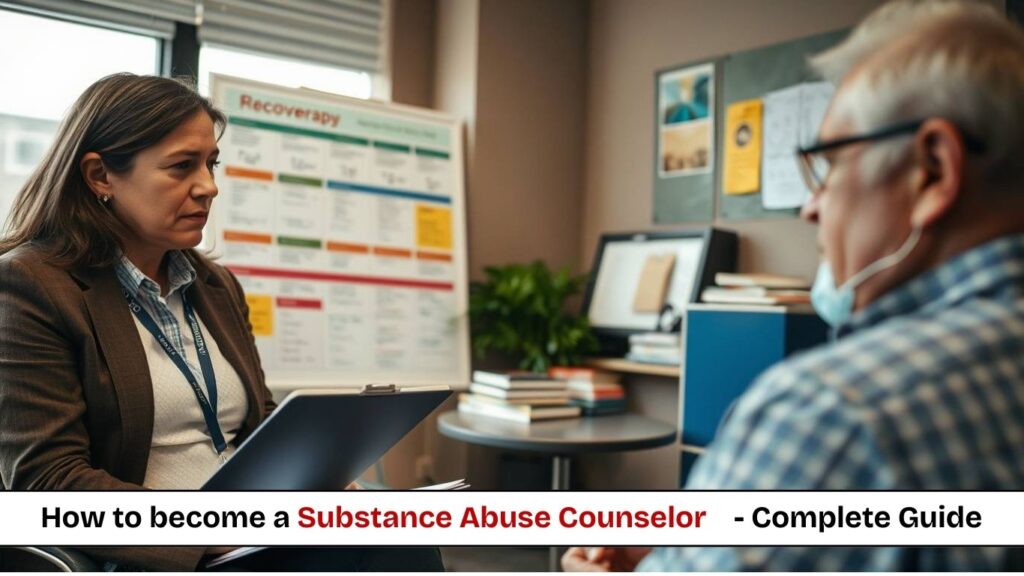
Introduction: The Vital Role of Addiction Counselors
Substance abuse counselors serve on the frontlines of America’s addiction crisis, providing life-changing support to individuals battling drug and alcohol dependence. With overdose deaths reaching record highs and addiction treatment demand growing exponentially, these compassionate professionals have never been more essential.
This definitive guide covers everything you need to launch or advance your career in addiction counseling:
- Historical evolution of addiction treatment
- Salary expectations by state and setting
- Day-to-day responsibilities explained
- Education & licensing requirements
- Step-by-step career path
- Future industry trends
- Specialization opportunities
Whether you’re considering entering the field or seeking career advancement, this guide provides the roadmap to success in this rewarding profession.
History of Substance Abuse Counseling
Early Approaches (1700s-1930s)
- Temperance movements framed addiction as moral failure
- Inebriate asylums offered custodial care rather than treatment
- 1935: Alcoholics Anonymous founded, introducing peer support model
Medicalization Era (1940s-1970s)
- 1956: AMA classified alcoholism as disease
- 1960s: Therapeutic communities emerged (Synanon)
- 1970: NIDA established, legitimizing addiction research
Professionalization (1980s-Present)
- 1980s: Cocaine epidemic spurs treatment demand
- 1990s: Evidence-based practices standardized
- 2000s: Opioid crisis transforms treatment approaches
- 2010s: Medication-assisted treatment (MAT) gains acceptance
Substance Abuse Counselor Salaries (2024 Data)
Salaries vary dramatically by:
- Geographic location
- Work setting (hospital vs. outpatient)
- Credentials and experience
- Specializations
United States Salary Ranges
| Position | Entry-Level | Experienced | Top 10% |
|---|---|---|---|
| Counselor (Bachelor’s) | $35,000 | $47,000 | $62,000 |
| Licensed Counselor (Master’s) | $45,000 | $58,000 | $78,000 |
| Clinical Supervisor | $55,000 | $72,000 | $95,000 |
| Program Director | $65,000 | $85,000 | $120,000+ |
Highest-Paying States
- California: $58,000 avg
- New York: $56,000
- Massachusetts: $54,000
- New Jersey: $52,000
- Connecticut: $51,000
Work Setting Pay Comparison
- Hospitals: $52,000
- Outpatient Centers: $47,000
- Residential Facilities: $43,000
- Private Practice: $65,000+
- Government: $56,000
Roles & Responsibilities
Substance abuse counselors perform multifaceted work across these key areas:
1. Clinical Assessment
- Conduct ASAM dimensional assessments
- Screen for co-occurring disorders
- Determine appropriate level of care
2. Treatment Planning
- Develop individualized recovery plans
- Set measurable treatment goals
- Coordinate with multidisciplinary teams
3. Intervention Delivery
- Facilitate individual counseling sessions
- Lead evidence-based group therapies
- Provide crisis intervention services
4. Case Management
- Connect clients with community resources
- Coordinate with probation officers
- Assist with housing/job placement
5. Documentation & Compliance
- Maintain detailed progress notes
- Complete insurance documentation
- Ensure HIPAA compliance
Education & Certification Requirements
Entry-Level Pathways
- High School Diploma + Certification (Some states)
- Associate’s Degree (CADAC-I level)
- Bachelor’s in Psychology/Social Work (Preferred)
Advanced Practice Requirements
- Master’s Degree (For independent licensure)
- 3000+ Supervised Clinical Hours
- State Licensing Exam
Essential Certifications
- CADAC (Certified Alcohol & Drug Counselor)
- LADC (Licensed Alcohol & Drug Counselor)
- MAC (Master Addiction Counselor)
- CAC (Certified Addiction Counselor)
How to Become a Substance Abuse Counselor: 5-Step Path
Step 1: Earn Your Degree
- Complete relevant coursework in:
- Abnormal psychology
- Counseling theories
- Pharmacology of addiction
Step 2: Gain Supervised Experience
- Complete internship hours
- Work as counseling technician
- Volunteer at recovery centers
Step 3: Obtain Licensure
- Pass IC&RC exam
- Complete background check
- Apply for state credential
Step 4: Choose Your Specialty
- Medication-Assisted Treatment (MAT)
- Adolescent Addiction
- Trauma-Informed Care
- Forensic Addiction Counseling
- Dual Diagnosis Treatment
Step 5: Pursue Continuing Education
- Complete CEUs annually
- Earn advanced certifications
- Consider clinical supervision credential
Future Outlook & Industry Trends
Explosive Job Growth
- 23% projected growth (2022-2032)
- Over 42,000 new positions expected
- Driven by opioid crisis and mental health parity laws
Emerging Treatment Modalities
- Digital Therapeutics
- Prescription apps (reSET-O)
- Virtual reality exposure therapy
- Genomic Medicine
- Pharmacogenetic testing
- Personalized medication protocols
- Integrated Care Models
- Behavioral health clinics in primary care
- Hospital-based addiction consult services
- Harm Reduction Expansion
- Supervised consumption sites
- Widespread naloxone distribution
- Workforce Innovations
- Peer recovery specialist roles
- Telehealth counseling platforms
Is Substance Abuse Counseling Right For You?
Ideal Candidates Possess:
✔ Strong emotional resilience
✔ Cultural competency skills
✔ Boundary-setting ability
✔ Passion for social impact
Career Advancement Paths:
➔ Clinical supervisor
➔ Program director
➔ Private practice owner
➔ Policy advocate
➔ Addiction researcher
Getting Started Today:
- Contact your state credentialing board
- Enroll in addiction studies courses
- Volunteer at local treatment center
- Join NAADAC professional association
Conclusion: A Career That Saves Lives
Substance abuse counseling offers unparalleled opportunities to create meaningful change during America’s addiction crisis. With strong job security, diverse specialization options, and the profound satisfaction of helping individuals reclaim their lives, this career path delivers both professional fulfillment and social impact.
As treatment approaches evolve and stigma decreases, addiction professionals will continue playing pivotal roles in building healthier communities. Your journey toward this rewarding career starts today.













Post Comment